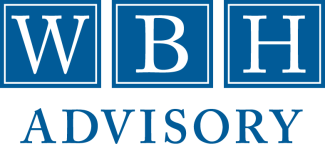At WBH Advisory, we’re not your typical financial firm. For over 30 years, we’ve been helping our clients with independent advice and practical financial guidance. As fee-only advisors, we keep it simple – no hidden agendas, just your best interests in mind. Our team, backed by respected qualifications, is here to help turn your resources into real outcomes. We’re not just about numbers; we’re about helping you get the life you want. Let’s navigate life and wealth together with straightforward planning and smart investment management. Consider us your financial ally – approachable, reliable, and committed to your success.
What Does “Fee-Only” Mean?
Fee-only refers to the way we are compensated for our services. We do not receive commissions for any of the investment recommendations that we make. Rather, we are paid based on a percentage of the assets that we manage. Alternatively, in certain circumstances, we make flat fee or hourly fee arrangements. We believe this compensation method is more transparent than commission-based methods of compensation, while also limiting conflicts of interest. Please refer to our form ADV, Part 2A, for additional information about our compensation practices and potential conflicts of interest that may arise.
More About Our Credentials
We take a team approach to building custom investment portfolios for our clients. While most clients have a trusted contact who they can go to directly with questions, investment decisions are primarily guided by our team of advisors and investment committee, leveraging their collective expertise. In addition to decades of experience, our advisors have earned some of the most trusted credentials in the industry, among them, CFA®, CFP®, and CPA.
The Chartered Financial Analyst (CFA) charter is a globally respected, graduate-level investment credential established in 1962 and awarded by CFA Institute — the largest global association of investment professionals. To earn the CFA charter, candidates must: (1) pass three sequential, six-hour examinations; (2) have at least four years of qualified professional investment experience; (3) join CFA Institute as members; and (4) commit to abide by, and annually reaffirm, their adherence to the CFA Institute Code of Ethics and Standards of Professional Conduct.
The CFA Institute Code of Ethics and Standards of Professional Conduct, enforced through an active professional conduct program, require CFA charter holders to:
- Place their clients’ interests ahead of their own
- Maintain independence and objectivity
- Act with integrity
- Maintain and improve their professional competence
- Disclose conflicts of interest and legal matters
The CFP® certification is a voluntary certification; no federal or state law or regulation requires financial planners to hold CFP® certification. It is recognized in the United States and a number of other countries for its (1) high standard of professional education; (2) stringent code of conduct and standards of practice; and (3) ethical requirements that govern professional engagements with clients. Currently, more than 76,000 individuals have obtained CFP® certification in the United States.
To attain the right to use the CFP® marks, an individual must currently satisfactorily fulfill the following requirements:
- Education – Complete an advanced college-level course of study addressing the financial planning subject areas that CFP Board’s studies have determined as necessary for the competent and professional delivery of financial planning services, and attain a Bachelor’s Degree from a regionally accredited United States college or university (or its equivalent from a foreign university). CFP Board’s financial planning subject areas include insurance planning and risk management, employee benefits planning, investment planning, income tax planning, retirement planning, and estate planning;
- Examination – Pass the comprehensive CFP® Certification Examination. The examination, administered in 6 hours, includes case studies and client scenarios designed to test one’s ability to correctly diagnose financial planning issues and apply one’s knowledge of financial planning to real world circumstances;
- Experience – Complete at least three years of full-time financial planning-related experience (or the equivalent, measured as 2,000 hours per year); and
- Ethics – Agree to be bound by CFP Board’s Standards of Professional Conduct, a set of documents outlining the ethical and practice standards for CFP® professionals.
Individuals who become certified must complete the following ongoing education and ethics requirements in order to maintain the right to continue to use the CFP® marks:
- Continuing Education – Complete 30 hours of continuing education hours every two years, including two hours on the Code of Ethics and other parts of the Standards of Professional Conduct, to maintain competence and keep up with developments in the financial planning field; and
- Ethics – Renew an agreement to be bound by the Standards of Professional Conduct. The Standards prominently require that CFP® professionals provide financial planning services at a fiduciary standard of care. This means CFP® professionals must provide financial planning services in the best interests of their clients.
CFP® professionals who fail to comply with the above standards and requirements may be subject to CFP Board’s enforcement process, which could result in suspension or permanent revocation of their CFP® certification.
CPAs are licensed and regulated by their state boards of accountancy. While state laws and regulations vary, the education, experience and testing requirements for licensure as a CPA generally include minimum college education (typically 150 credit hours with at least a baccalaureate degree and a concentration in accounting), minimum experience levels (most states require at least one year of experience providing services that involve the use of accounting, attest, compilation, management advisory, financial advisory, tax or consulting skills, all of which must be achieved under the supervision of or verification by a CPA), and successful passage of the Uniform CPA Examination.
In order to maintain a CPA license, states generally require the completion of 40 hours of continuing professional education (CPE) each year (or 80 hours over a two-year period or 120 hours over a three-year period). Additionally, all American Institute of Certified Public Accountants (AICPA) members are required to follow a rigorous Code of Professional Conduct which requires that they act with integrity, objectivity, due care, competence, fully disclose any conflicts of interest (and obtain client consent if a conflict exists), maintain client confidentiality, disclose to the client any commission or referral fees, and serve the public interest when providing financial services. The vast majority of state boards of accountancy have adopted the AICPA’s Code of Professional Conduct within their state accountancy laws or have created their own.
In addition to the Code of Professional Conduct, AICPA members who provide personal financial planning services are required to follow the Statement on Standards in Personal Financial Planning Services (SSPFPS).
Please Note (Limitations): The achievement of any professional designation, certification, degree, or license should not be construed by a client or prospective client as a guarantee that he/she will experience a certain level of results or satisfaction if WBH is engaged, or continues to be engaged, to provide investment advisory services.


